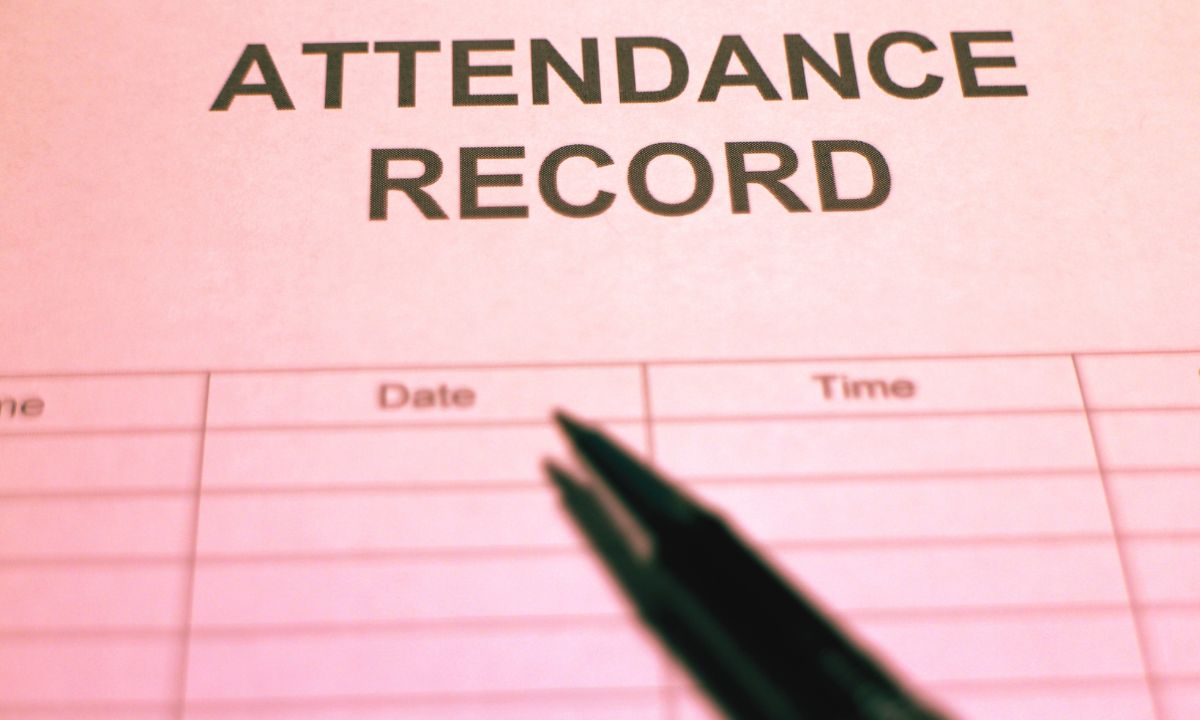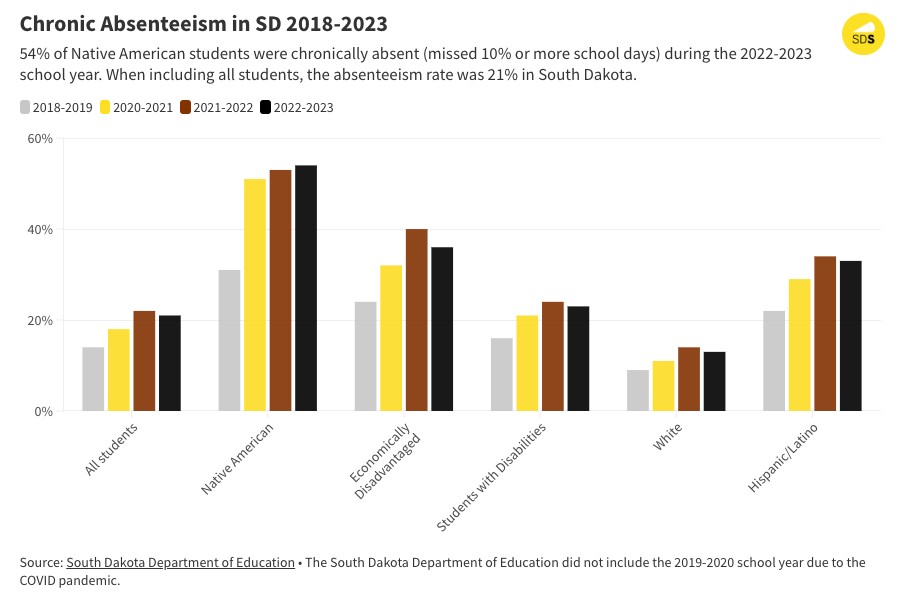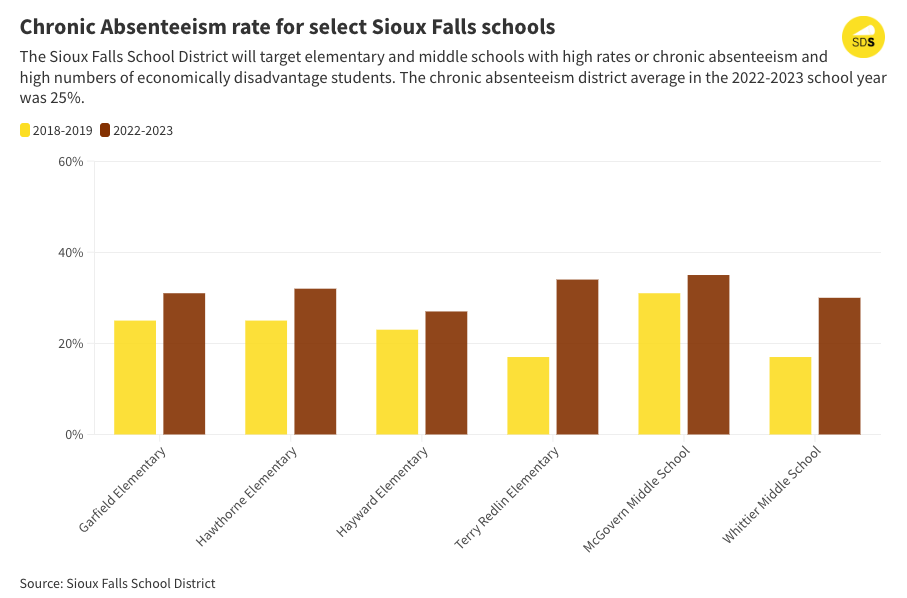1 in 5 Students, Majority of Native American Pupils, Chronically Absent in South Dakota
The state is awarding millions to schools to address the ongoing issue of kids missing 10% or more of school days.

Get stories like this delivered straight to your inbox. Sign up for The 74 Newsletter
Student absenteeism is one of the biggest problems facing South Dakota public education, said state Secretary of Education Joseph Graves.
Chronic absenteeism among South Dakota students jumped from 14% during the 2018-2019 school year to 21% during the 2022-2023 school year. That increase is more pronounced among Native American students, whose chronic absenteeism rates jumped from 31% to 54% in the same timeframe.
Chronic absenteeism is when a student misses 10% or more days of school within the school year.
Attendance and academic performance are directly correlated.
“School is how we bring kids to understand their role in the world. You can’t educate kids who aren’t there,” Graves told South Dakota Searchlight. “The key to the American Dream is a great education. If you get a great education, you can go anywhere in life.”
The state Department of Education is handing out millions of dollars in grants to school districts over the next three years to address student absenteeism through research-based programs.
‘Doesn’t feel right’: Some schools with significant Native American representation miss out on grants
The COVID-19 pandemic exacerbated absenteeism in school districts across South Dakota.
“The pandemic put education as a lower priority over other issues,” Graves said. “That sunk in with a lot of people, and we saw a definite decline in attendance rates of students.”
Recovery is taking longer than expected — both in South Dakota and nationally, Graves said. Some demographic groups are faring worse than others — including Native American children, Hispanic or Latino children, and economically disadvantaged children.
Sioux Falls will be awarded $1.5 million over the next three years to address absenteeism. The district was one of nine to receive awards, including Pierre, Wilmot, Waubay, Sisseton, Watertown, Mitchell, Leola and Spearfish — all at varying amounts.
Out of the school districts selected, Sisseton has the highest representation of Native American students at 54% of its student body, according to 2023 enrollment reports from the department. Waubay and Wilmot’s student bodies are 34% and 22% Native American. All of the other schools receiving grants have Native American student populations lower than 20%. School districts that serve majority Native American student bodies, such as Oglala Lakota County, Todd County and White River, were not awarded the grants.
Superintendent Roberta Bizardie of the Todd County School District said the district applied and was surprised when it was not awarded a grant. Native American students make up 94% of the student body, and the school district has a chronic absenteeism rate of 40%.
“I just didn’t feel right,” Bizardie said when she saw which schools were awarded grants.
There are three social workers serving the school district’s 2,000 children — many of whom are economically disadvantaged. The application planned to use money to hire more social workers and attendance liaisons dedicated to absenteeism issues.
Since the district was not awarded a grant, Bizardie plans to work with the Rosebud Sioux Tribe’s truancy department to reach out to families. They’ll continue using their social workers, sending daily calls to parents when their child isn’t in school, creating more family engagement events and encouraging attendance with incentives for students.
A representative from the Department of Education told the district that the reason it did not receive a grant was because some of the line-item expenses listed in the budget weren’t “clearly listed in our narrative,” Bizardie said.
While Native American students, on average, have higher chronic absenteeism rates and lower academic achievement rates than other demographic groups, it goes hand in hand with socioeconomic status, Graves said.
Out of the demographic groups, low socioeconomic status is the most important to address, he added.
Graves said Native American education is seeing a “small renaissance” through private programming closely connected with culture and language. He plans to keep an eye on those programs.
“What I think public schools need to do, and what I’m hoping they’ll do, is that they’ll watch that renaissance of private education and think about what we can do to adapt and serve students who attend public education,” Graves said.
Districts spend grants on transportation, mentoring & engagement
The student absenteeism grant effort is funded through the federal Bipartisan Safer Communities Act of 2022. The schools will report on progress at the end of each school year until the grant is finished.
The awarded districts are addressing absenteeism differently, though all will spend some of the money on transportation, mentoring or engagement activities to entice students to attend school.
Sioux Falls will target elementary and middle schools with predominantly economically disadvantaged students. Working with younger children will “catch them at an early age” before a student loses too much ground or incentive to attend school, said Assistant Superintendent James Nold.
“A significant way out of poverty is through education,” Nold said. “We can encourage attendance, have staff and programs in place all to give a meaningful education and pull children out of poverty. Education hits on so many fronts; it’s so important to have a child in school on a daily basis.”
Attendance liaisons focus on relationships, mentoring
The most popular use of the grant funds is hiring an attendance liaison or advocate to build connections with students and families who struggle with attendance.
In Sisseton, the school district hired Michelle Greseth to implement the national intervention program “Check and Connect,” which focuses on relationship building between a mentor and a student. During the 2021-2022 school year, 26% of Sisseton high school students were chronically absent. So far during the 2023-2024 school year — after implementing the program and an attendance awareness campaign for students and families — 11% of high school students are chronically absent.
Greseth or other trained staff plan to work with students and families for a minimum of two years, reviewing data and educational progress, behaviors, attendance and intervention efforts.
Greseth said she’s already seeing progress in the nearly dozen middle school and high school students she began meeting weekly during the fall semester.
“If you don’t have the relationship then the data isn’t that meaningful because they’re not willing to buy in — you really want to know the kid and what drives them and motivates them,” Greseth said. “They won’t care about how much you know until they know how much you care.”
Sioux Falls hired six liaisons committed to student attendance and one recovery teacher to help middle school students who have fallen behind in their academics. Wilmot School District Superintendent Larry Hulscher said about 10% of its students are chronically absent.
Hiring just one attendance advocate for the small school district will help alleviate the burden on already overworked staff, Hulscher said. Principals, teachers and school resource officers across the state have attempted to build those attendance relationships in years past.
“Quite honestly, we haven’t been able to dedicate much time to that as the other responsibilities that come with those jobs,” Hulscher said. “This person can dedicate all of their time to this.”
Watertown plans to hire three family support specialists. Watertown’s chronic absenteeism rate has hovered around 20% over the last three years, said Superintendent Jeff Danielsen.
“The principal represents authority and the SRO represents authority,” Danielsen said, using the abbreviation for “school resource officers,” the law enforcement officers present in some schools. “This position is for someone who won’t have those titles; someone who can catch more flies with honey than vinegar.”
Enhancing extracurricular activities
Getting students involved in at least one extracurricular activity they’re passionate about — sports, theater, debate, student government — will help carry them through school and to graduation, Graves said.
“Almost nobody liked every subject in school, but almost everybody got through it even though they didn’t like them,” Graves said. “Like a student who isn’t fond of English but has to pass the class because he loves football and can’t play otherwise. That engagement is huge. If you’re not engaging kids, you’re missing a large part of the boat.”
Graves served as the Mitchell superintendent before joining Gov. Kristi Noem’s administration.
The Mitchell School District plans to hire an attendance liaison and social worker like other awarded schools, but Superintendent Joe Childs also plans to build a “robust offering” of extracurriculars in the district’s “Kernel Club,” which is an after-school program for children transitioning from elementary school to middle school. The school district has an 18% chronic absenteeism rate.
Kernel Club activities are currently limited to two sports: volleyball and basketball. Childs plans to expand offerings to cover more sports, performing arts and visual arts opportunities.
Graves hopes school districts across the state will continue to invest in Career and Technical Education and Jobs for America’s Graduates programs, which have also led to higher attendance rates and student participation rates.
The goal, Graves said, is to course-correct and bring statewide chronic absenteeism and general absenteeism rates back down to pre-pandemic numbers.
The hope for Sioux Falls, Nold said, is that the programs implemented by the district are “so effective that we can’t do without them in three years.”
South Dakota Searchlight is part of States Newsroom, a network of news bureaus supported by grants and a coalition of donors as a 501c(3) public charity. South Dakota Searchlight maintains editorial independence. Contact Editor Seth Tupper for questions: [email protected]. Follow South Dakota Searchlight on Facebook and Twitter.
Get stories like these delivered straight to your inbox. Sign up for The 74 Newsletter

;)

